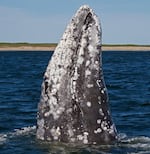Researchers are suggesting a new reason why seemingly healthy gray whales get stranded sometimes on shore. An analysis published Monday in the journal Current Biology found a high correlation between these kinds of stranding and radio frequency noise associated with solar storms.

A western gray whale is pictured off Sakhalin Island, Russia. In the 1970s, scientists thought the western gray whale had gone extinct. Now researchers estimate that about 150 individual whales remain.
Craig Hayslip / OSU Marine Mammal Institute
Thousands of gray whales pass along the Oregon and Washington coast each year and a small percentage of those whales wash ashore during their West Coast migration. Most stranded whales are already dead or sick, weak or injured. But some are alive and there isn’t an obvious reason why they would have washed up.
Duke University researcher Jesse Granger looked at these kinds of cases over the past 30 years and compared them to when solar storms occurred.
“Solar storms are this huge outburst of high-energy particles that interact with the earth’s magnetic field. It can push the field around or it can potentially disrupt an animal’s – who’s trying to sense the magnetic field – ability to see it,” she said.
Whales are believed to use the earth’s magnetic field as a sort of map they use to navigate from breeding grounds south of California to feeding grounds off the coast of Alaska.
Granger’s analysis found that gray whales were more than twice as likely to get stranded during solar storms as they were at other times. But it wasn’t because the storms were changing the map. Instead the strandings correlated with times when the solar storms created large amounts of radio frequency noise – think the fuzz you hear between stations on the radio.
“The animal isn’t actually receiving the radio frequency noise. It’s that the radio frequency noise is preventing their magnetic receptor from working,” Granger said.
Or put another way: A map isn’t useful if you can’t see it.
Oregon State University marine mammal stranding coordinator Jim Rice says he is surprised by the findings.
“I wouldn’t expect something like that to be the case, although I wouldn’t rule it out of hand either. There’s a lot of things that happen that we aren’t aware of and we learn down the line that things are more complicated than they appear,” he said.
Rice says it’s very rare that living whales get stranded – in Oregon only a handful have in the past 30 years, and most of those were calves that were separated from their mothers.
He also says gray whales are experts at navigating coastal waters. It’s not uncommon to see them feeding in the surf zone, very close to shore.
“They know as well as anything out there probably, just how close they can get to the beach safely. And yet they avoid getting themselves into trouble for the most part. So the suggestion that they get disoriented … I have a hard time accepting that would be the case, because I think they have so many cues that help them navigate,” Rice said.
Granger acknowledges that attributing whale strandings to solar storms is tricky. Because of the size and protected status of whales, testing directly how they navigate and how that navigation is disrupted is not really feasible.
“All we’re showing is that this is potentially another cause of stranding, but one of many,” she said. “At the very least we can say, ‘Oh, we’re in the middle of a solar maximum, perhaps we need to be a little more active about looking for these live strandings.’”
